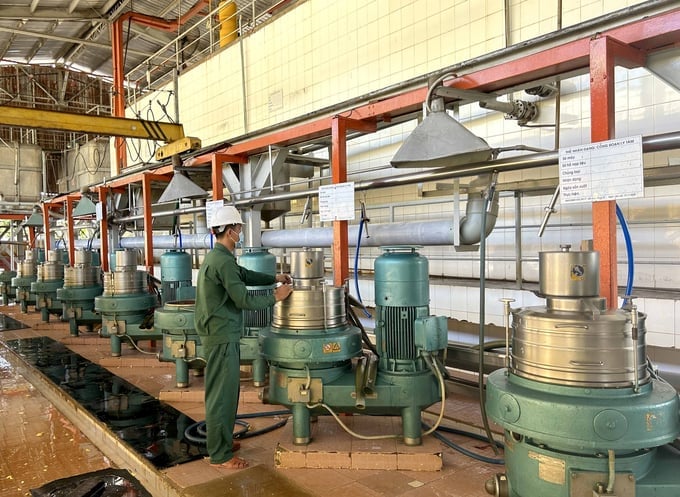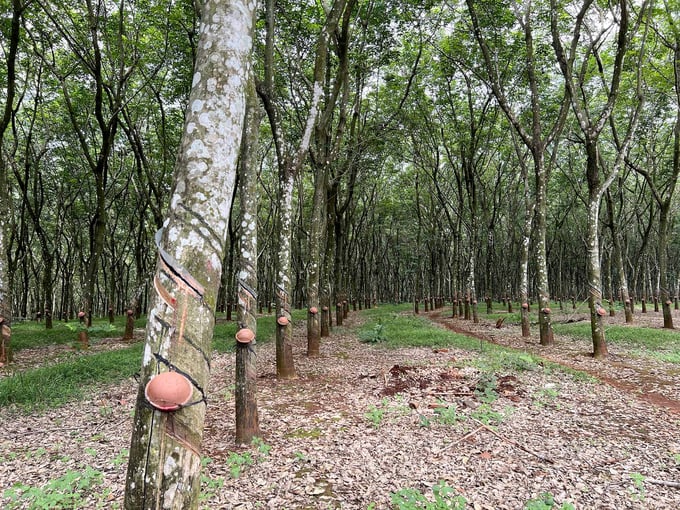June 21, 2025 | 00:54 GMT +7
June 21, 2025 | 00:54 GMT +7
Hotline: 0913.378.918
June 21, 2025 | 00:54 GMT +7
Hotline: 0913.378.918

Tay Ninh Rubber workers extracting rubber latex. Photo: Tran Phi.
Tay Ninh Rubber Joint Stock Company (Tay Ninh Rubber, Taniruco) is a unit with a long tradition of the Vietnam Rubber Group (VRG). After nearly 50 years of establishment and development, Tay Ninh Rubber has been awarded many noble titles such as Labor Hero, First Class Labor Medal, Second Class Labor Medal...
Even though they have such a rich tradition, Tay Ninh Rubber has had times of difficulty and confusion when orienting development for the future. This is until the company accesses the Vietnam Forest Certification System (VFSC). Nguyen Hong Thai, Deputy General Director of Tay Ninh Rubber, shared: “Before approaching VFCS, the company did not have a clear path in development direction. However, after approaching VFCS, we had clear directions and goals".
In the process of implementing sustainable forest management, initially, Taniruco initially encountered many difficulties and challenges, from the awareness and understanding of officials, workers, and labourers to how to implement the criteria... However, with the determination of the company's leaders and the active participation of departments and organizations such as trade unions and youth unions..., the implementation of sustainable forest management in Tay Ninh Rubber has been gradually improved.
Currently, Tay Ninh Rubber has completed a sustainable forest management plan and has a VFCS/PEFC-FM Forest Certificate. At the same time, the company has received PEFC-CoC Chain of Custody certification. Currently, the company is continuing to maintain a sustainable forest management system and invites organizations to evaluate and monitor the system in the following years.
Another unit of VRG in Tay Ninh province, Tan Bien Rubber Joint Stock Company, has also implemented sustainable forest management. In 2023, Tan Bien Rubber was evaluated and maintained by the GFA organization and granted VFCS/PEFC national forest certification for a total rubber area of more than 4 thousand ha. In addition, the company continues to implement and has been re-certified for PEFC-CoC and DDS product chain of custody certification by the SGS organization.
Up to this point, VFSC-certified natural rubber still accounts for a small proportion of rubber companies. As for Tay Ninh Rubber, VFSC-certified rubber only accounts for about 3% of revenue. One of the important reasons is that customers do not have much demand for "green" rubber products.

Tan Bien Rubber's latex processing factory. Photo: Tran Phi.
However, "green" rubber products have begun to have positive impacts on the image and reputation of the unit. Mr. Truong Van Cu, General Director of Tan Bien Rubber, said that after receiving VFCS certification, the price of the company's products increased a bit. In particular, customers feel more secure and they do not need to observe the products directly when the company makes all of its sustainability certifications transparent. This significantly increases the number of customers and allows the company to have options in transactions.
Mr. Nguyen Hong Thai evaluated the application of strategies for sustainable forest management and CoC Product Chain of Custody System according to PEFC standards into production and business activities. He noted that the company's Board of Directors is very determined to create products with "green" values, enhancing sustainable competitiveness; and at the same time, ensuring responsibility for the environment and the social community in the rubber tree area.
Mr. Thai emphasized: “I believe that in the future, especially with customers' requests to use green products in demanding markets like Europe, the value of products with VFCS certification will increase and contribute to the company's production and business activities".
For his part, Mr Truong Van Cu shared: “We hope that in the future, with the increasing demand for green and clean products in the country and the world, the prices for natural rubber products with VFSC certification will be considered reasonable. Consumers will realize that spending a higher cost to use sustainable rubber products is good for the whole community. I believe this will bring better results for everyone”.
In this trend, natural rubber products have increased in value. Enterprises determine that the resources and people costs invested in sustainable development and green production are quite huge, but it is a responsibility and a decisive factor for development.

VRG's 275 thousand ha of rubber have had a Sustainable Forest Management Plan built. Photo: Thanh Son
By the end of the third quarter of this year, the entire Vietnam Rubber Group had 30 member companies building a Sustainable Forest Management Plan, an increase of 9 companies compared to the end of 2022. The Sustainable Forest Management Plan's total forest building area is 275 thousand ha (reaching 95% of the entire Group's area).
Currently, there are 18 VRG members (an increase of 1 company compared to the end of 2022) certified for sustainable forest management according to VFCS/PEFC with over 113 thousand ha of rubber, reaching 83% of the plan (an increase of more than 4,000 ha compared to the end of 2023). Besides, there are 37 factories (natural rubber processing, wood processing and rubber industrial products) that have been granted a product chain of custody management certificate according to PEFC-CoC international standards, an increase of 7 factories compared to the end of 2022.
Member units promote sustainable forest management and product chain of custody management, part of VRG's strategy to green the supply chain. The Group has set a goal that by 2030, 60% of rubber and production forest areas will achieve national and international sustainable forest management certification (VFCS/PEFC/FSC...) and 100% of rubber latex processing factories have chain of custody certification.
By 2050, the entire Group will have 100% of rubber and production forest areas certified for national and international sustainable forest management (VFCS/PEFC/FSC...). 100% of manufacturing plants (latex, wood, rubber industrial products...) will have chain of custody certification.
Translated by Hoang Duy
![Turning wind and rain into action: [9] Digitizing hydrometeorological data in response to climate change](https://t.ex-cdn.com/nongnghiepmoitruong.vn/608w/files/news/2025/06/17/z6704423696987_15fd32ffc26d590d204d520c9dac6786-nongnghiep-165943.jpg)
(VAN) Farmers have begun accessing hydrometeorological applications to adjust their cropping schedules, aiming to ensure productivity and adapt to climate change.
![Turning wind and rain into action: [8] Real-time salinity detection and early warning technology](https://t.ex-cdn.com/nongnghiepmoitruong.vn/608w/files/news/2025/06/17/z6704423696987_15fd32ffc26d590d204d520c9dac6786-nongnghiep-151127.jpg)
(VAN) Thanks to the integration of modern hydrological-hydraulic models, remote sensing technologies, and artificial intelligence, the accuracy of hydrological forecasting has significantly improved.
![Turning wind and rain into action: [7] Early disaster warnings help marine farmers minimize losses](https://t.ex-cdn.com/nongnghiepmoitruong.vn/608w/files/news/2025/06/17/z6704423696987_15fd32ffc26d590d204d520c9dac6786-nongnghiep-142942.jpg)
(VAN) In recent years, thanks to early disaster warnings and forecasting, marine farmers in Khanh Hoa province have been able to reduce risks and losses, thereby improving production efficiency.
![Turning wind and rain into action: [6] ‘Four on-the-spot’ disaster management software](https://t.ex-cdn.com/nongnghiepmoitruong.vn/608w/files/news/2025/06/17/e5a48259d6a262fc3bb3-nongnghiep-183800.jpg)
(VAN) By simply activating the scenario on the disaster management software, the relevant authorities immediately know how many households need to be evacuated, where to evacuate them to, and by what means of transportation…
![Turning wind and rain into action: [5] Hue applies modern technology in disaster forecasting](https://t.ex-cdn.com/nongnghiepmoitruong.vn/608w/files/news/2025/06/17/z6704423696987_15fd32ffc26d590d204d520c9dac6786-nongnghiep-093938.jpg)
(VAN) In Hue city, modern technology has recently been applied in meteorological and hydrological forecasting and warning, helping to reduce the damage caused by natural disasters.

(VAN) A cutting-edge farming technique being implemented on an experimental ranch in Arizona's Sonoran Desert has already saved a billion gallons of water over five years, according to Civil Eats.

(VAN) Poultry and pig production and the environment can be boosted through enhanced water technology, according to new research.